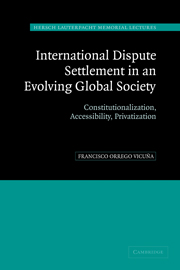 International Dispute Settlement in an Evolving Global Society
International Dispute Settlement in an Evolving Global Society Book contents
- Frontmatter
- Contents
- Preface
- Acknowledgements
- List of abbreviations
- Table of treaties
- Table of cases
- 1 An evolving international society: institutionalization, privatization, globalization
- 2 A constitutional court for an international society?
- 3 Individuals and settlement of international claims: change and adaptation of governing rules
- 4 Individuals before international courts and tribunals: a continuing progression
- 5 Shaping a new role for the individual in international dispute settlement: the contribution of specialized jurisdictions
- 6 The World Trade Organization integrated dispute settlement system: innovation and transition
- 7 An alternative dispute resolution system for international disputes
- 8 A centralized-decentralized dispute resolution system for the international community?
- Bibliography
- Index
2 - A constitutional court for an international society?
Published online by Cambridge University Press: 04 August 2010
- Frontmatter
- Contents
- Preface
- Acknowledgements
- List of abbreviations
- Table of treaties
- Table of cases
- 1 An evolving international society: institutionalization, privatization, globalization
- 2 A constitutional court for an international society?
- 3 Individuals and settlement of international claims: change and adaptation of governing rules
- 4 Individuals before international courts and tribunals: a continuing progression
- 5 Shaping a new role for the individual in international dispute settlement: the contribution of specialized jurisdictions
- 6 The World Trade Organization integrated dispute settlement system: innovation and transition
- 7 An alternative dispute resolution system for international disputes
- 8 A centralized-decentralized dispute resolution system for the international community?
- Bibliography
- Index
Summary
The process of decentralization of international society and international law makes it necessary to consider a new role for the basic principles of international law governing the international society. This element could enable a minimum degree of integration and coherence in such society and its legal order. In this context, the identification and development of such principles becomes a constitutional function.
This chapter will examine the main aspects of a long-standing constitutional debate relating to international law, with emphasis on its implications for the United Nations and the Security Council. The prospects for the establishment of a Constitutional Court for the world community, taking into account the role of the International Court of Justice, will also be examined.
Constitutional approaches to international law
The idea of introducing a constitutional dimension in international law is not new. In 1926 Verdross discussed the notion of constitutional international law. It was first identified with norms dealing with the structure, subdivision and distribution of spheres of jurisdiction in the international community, and later associated with the most important rules of general international law or specifically with the Principles embodied in the Charter of the United Nations.
This evolution reflects both a procedural (or formal) approach and a substantive one. It was owing to Kelsen's theoretical framework of the unity of the legal order and the identification of the basic norm of the international legal order as the ultimate reason for the validity of both the international and the national legal orders that this constitutional approach became possible.
- Type
- Chapter
- Information
- International Dispute Settlement in an Evolving Global SocietyConstitutionalization, Accessibility, Privatization, pp. 10 - 28Publisher: Cambridge University PressPrint publication year: 2004
